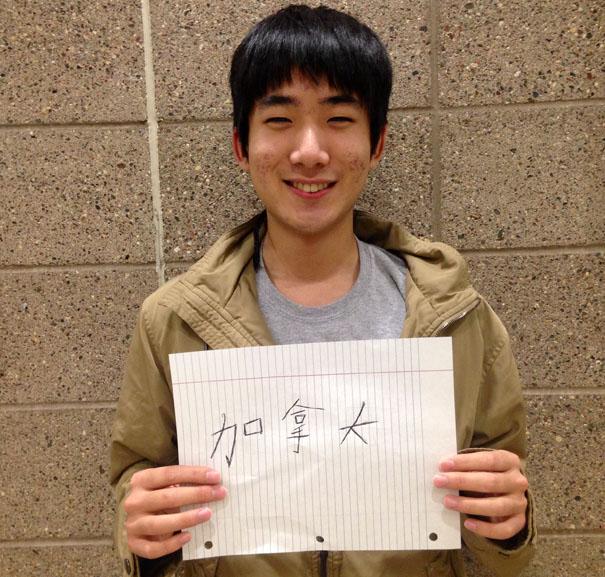American dream not only for ‘natives’
Junior Michael Tan holds a sign that says ‘Canadian’ in traditional Chinese characters to represent his identity in both cultures.
December 16, 2014
When I was in fourth grade I was called a terrorist for no other reason than my skin color. I’ve been told to go back home (which doesn’t make sense to me because I live in Urbandale). In fact I’ve been told a lot of things and all of them have been said to me by my classmates. All of us have passed the point in our lives where we can blame our age for our ignorance.
We need to become more aware of other cultures to avoid offending immigrants and people of other ethnicities. Of course you can’t always please everyone and someone will always be offended, but the problem itself is we do not make an effort. Growing up in a suburb in Iowa where a majority of the people are white, you would think I’d learn to deal with jokes, the ignorant questions and the shock of being the only ethnic person in the room. And the problem is I have, but as I’ve grown I’ve also learned that I shouldn’t have to put up with all of that. We live in America, one of the most diverse countries in the world, and if you’re still asking me if I eat curry everyday and worship cows we have a problem.
To put it into perspective, as of the 2013 census, 39.4% did not identify as white or Caucasian. 12.9% of those people were foreign born. On a smaller scale, out of the total population of Iowa only 10.8% do not identify as white or caucasian. In the city of Johnston alone we have 1,740 people who do not identify as caucasian or white. 1,346 of those people are foreign born.
When you look at the numbers, it is understandable that Iowans don’t have a lot of experience with ethnic people. However, this does not justify the ignorance that is very obviously present. Blatant disregard is not an excuse anymore when my peers purposefully call me out on my heritage and cultural differences. It’s not something I should be ashamed of and when you say “It was just a joke, calm down!” that doesn’t make me feel any better. My culture is so much more than elephants, curry, yoga and bindis (yes the little red dot has a name).
The harsh reality is people don’t think before they speak and choose not to educate themselves. When I say green card or Visa that automatically comes along with a negative connotation, but a majority of the people I talk to don’t know what their intended use is or how they work. One time I had someone even think that a green card is something you get to identify you as an illegal immigrant. Visas have less stereotypes clinging to them but that doesn’t stop the comments.
One of my biggest pet peeves is when people make jokes about it. Immigrants and the foreign born tend to have unique and complex situations and poking fun is just rude. For example, my entire family is on a green card because our living situation is permanent, and we simply have not gone through the hassle of applying for citizenship (it really is a ton of work). Visas are for more temporary or changing situations.
Having either of these does not make someone less American. There is no set definition for an American. That quarter Italian you’re so proud of, why does it make you more American than me? A majority of us have spent our entire lives here and this is all we know, we just weren’t born here. Just like you, I go crazy with pride on the 4th of July, the American flag flies in front of my house year round while some of my Caucasian neighbors don’t put up the flag at all.
Just because we live in a society where the majority is Caucasian, does not mean it’s rational for us to be so unaware. The world is so much bigger than the small suburb of Johnston, Iowa. With what little knowledge we have about other cultures paired with common stereotypes, we go ahead and deem ourselves experts.
The issue doesn’t only pertain to one single person though, and many of my fellow classmates have had similar experiences. Junior Chris Alvarez has grown up in Des Moines and is more immersed in the American culture than his own Mexican culture. However, he finds that people continue to project negative stereotypes on him.
When others try to understand his culture Alvarez has experienced both the negative and positive side, but he as just learned to accept it. Alvarez agrees the problem stems from racial proportions in Iowa. “Lots of people in Iowa have not been exposed to other cultures and different colored people,” Alvarez said.
But being white and foreign brings a whole new angle to it. We don’t consider those that look Caucaisan to be ethnically different due to the color of their skin. Sophomore Tara Djukonovic understands that when people look at her they don’t automatically jump to the conclusion that she’s a full blooded Serbian. Despite being more racially accepted, she has felt the sting of our innocence and can still recall the most offending thing she has been told. “Because I’m not from America I don’t deserve the same opportunities because ‘I’m not a real american’,” Djukanovic said.
When people do take a moment and pull their head out of the ground and notice that Djukanovic has a unique culture, she tends to have a good experience with them. “When people try to understand my culture it shows an interest in where I’m from, and it show’s that people are trying to become more culturally aware, and if everyone was just a little bit more educated it would avoid situations where people are getting offended,” Djukanovic said.
Junior Michael Tan has felt the negative side of our unawareness also. Just like many others, Tan has to deal with stereotypes being used as insults against him. “Well they automatically think, ‘Oh you’re communist just because you’re Chinese.’ That’s not always true,” Tan said. In fact, while Tan has a strong link with his Chinese heritage, but he identifies as a Canadian because he was born and raised there, which people fail to realize.
Recently Tan had to go back to Canada to renew his Visa, and the comments that followed towards him weren’t very pleasant. “Yeah, (the comments) kind of (bothered me) but you can’t really blame people because sometimes the people even doing the documentation aren’t even educated on them,” Tan said. “Everyone identifies as their culture and they automatically expell those that are different from them.”
Of course there are people who do understand and make an effort to be considerate. In fact many people are curious and ask polite questions. They want to learn but the issue is the majority of these people are adults. As a teenager I tend to interact with people my own age and not adults. Also I’m not saying you can’t make joke because I do too, but there’s a thin line and as a society we tend to be on the wrong side of it. There’s a difference between making a joke and being rude.
Think of it this way, what if someone made fun of your hair color or eye color? I’m pretty sure people with red hair and freckles and blondes are tired of having stereotypes made about something they can’t change. That’s the same as someone’s culture or race, we’re born and raised into it. It’s not something we can change. Honestly if you’re polite and genuinely want to know the answer to a question, most people don’t mind answering it no matter what it is. In fact, most of us like curious people. Just by taking this small initiative, a lot of problems can be solved. Next time you see someone that’s not white and you feel the need to make comment on it, please don’t.





